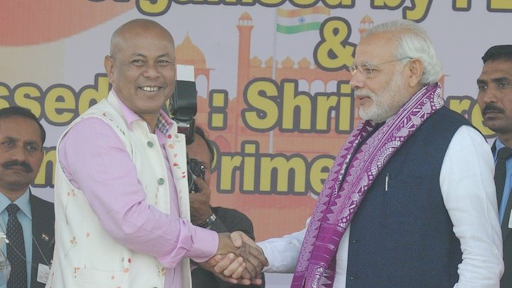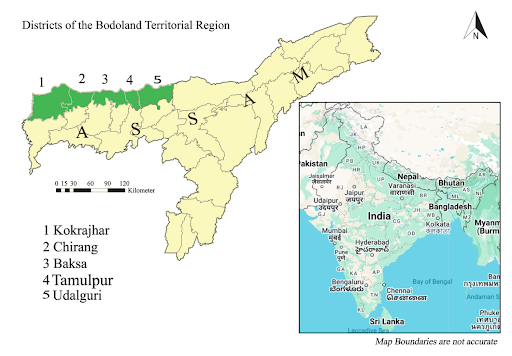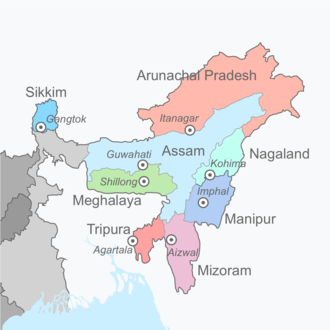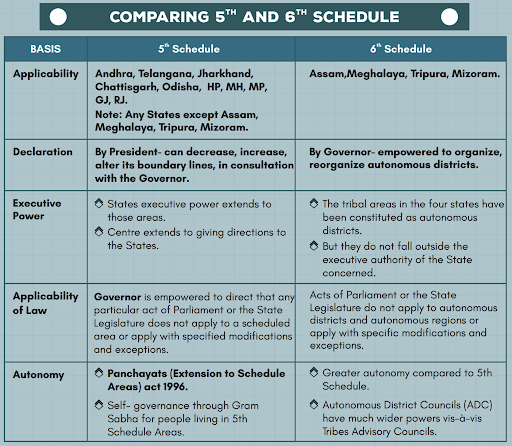



The Bodoland Territorial Council (BTC), formed under the Sixth Schedule in 2003, governs the Bodoland Territorial Region in Assam. It provides autonomy to the Bodo people over areas like land, forests, and local development, promoting peace, identity, and regional self-governance.

Copyright infringement not intended
Picture Courtesy: DD NEWS
Prime Minister Narendra Modi congratulated Hagrama Mohilary on being sworn in as the new Chief Executive Member (CEM) of the Bodoland Territorial Council (BTC).
It is a politically and administratively autonomous region in Assam, located on the north bank of the Brahmaputra River, bordering the foothills of Bhutan and Arunachal Pradesh.

It is administered by the Bodoland Territorial Council (BTC) and is largely inhabited by the Bodo tribe in Assam.
|
Bodo Tribe
|
Early Movements (1967): Plains Tribes Council of Assam first raised the demand for autonomy for tribal areas.
Bodo Movement (1987): All Bodo Students’ Union (ABSU) launched a mass movement demanding a separate state of "Bodoland."
First Bodo Accord (1993): Creation of the Bodoland Autonomous Council (BAC), with limited administrative and financial powers.
Second Bodo Accord (2003): Dissatisfaction with the BAC led to renewed agitation. The second accord resulted in the creation of the Bodoland Territorial Council (BTC) under the Sixth Schedule of the Constitution, granting greater autonomy and powers.
Third Bodo Peace Accord (2020): Signed between the central and state governments and Bodo groups, including all factions of the National Democratic Front of Bodoland (NDFB).
Renaming to BTR
The Bodoland Territorial Areas District (BTAD) was renamed the Bodoland Territorial Region (BTR).
Enhanced Powers
The BTC was granted more executive, legislative, and financial powers. Its membership was increased from 40 to 60 to ensure wider representation.
Boundary Readjustment
A commission was established to redraw the BTR's boundaries, to include bordering Bodo-majority villages outside the BTR and exclude non-Bodo majority villages currently within it, making the region more homogenous.
Language and Culture
The Bodo language (in Devanagari script) was recognized as an associate official language of Assam.
The BTR was granted the right to participate in national sports and cultural events, such as the Khelo India Youth Games, under its own banner, strengthening its distinct identity.
Economic Package
A special development package of ₹1500 crore was announced for the region's infrastructure development.
The special administrative status of the BTR is derived from the Sixth Schedule of the Constitution.
The 6th schedule contains provisions for the administration of tribal areas in four northeastern states: Assam, Meghalaya, Tripura, and Mizoram, under Article 244(2).

Key Powers of Autonomous Councils under the Sixth Schedule:
Legislative Powers
Autonomous District Councils (ADCs) can make laws on subjects like land management (excluding reserved forests), inheritance of property, marriage, divorce, and social customs. All such laws require the Governor’s assent.
Acts of Parliament or the state legislature do not apply directly to these regions or may apply with modifications specified by the council.
Developmental Powers
Councils have the power to establish and manage primary schools, dispensaries, markets, fisheries, and roads. This allows them to control local development priorities.
Financial & Taxation Powers
Councils can assess and collect land revenue and impose taxes on professions, trades, vehicles, and entry of goods into their areas. They can also grant licenses for mineral extraction.
Judicial Powers
They can establish Village and District Council Courts to try cases and disputes where both parties are from Scheduled Tribes within their jurisdiction. These courts handle matters based on traditional customs and laws.
Governor's Role
The Governor has the power to organize and reorganize the autonomous districts, alter their boundaries, and appoint commissions to review their administration.

The Bodoland Territorial Council exemplifies how autonomy under the Sixth Schedule promotes peace and inclusivity. Strengthened by the 2020 BTR Accord, its success depends on balancing development with preserving cultural and ethnic identity.
Source: NEWSONAIR
|
PRACTICE QUESTION Q. Consider the following statements about the Bodoland Territorial Council (BTC):
Which of the statements given above is/are correct? A) 1 and 2 only B) 3 only C) 1, 2 and 3 D) None Answer: D Explanation: Statement 1 is incorrect: The BTC was established under the Sixth Schedule of the Constitution, not the Fifth Schedule. Statement 2 is incorrect: The BTC has legislative powers over 40 specific subjects, not all subjects in the State List. Its powers are defined within the framework of the Sixth Schedule. Statement 3 is incorrect: The Chief Executive Member is the leader of the majority party or coalition in the elected council, not appointed by the President. The Governor of Assam administers the oath of office and secrecy to the council members. |
The BTC is an autonomous self-governing body for the Bodo-dominated areas in Assam, established under the Sixth Schedule of the Indian Constitution.
The 6th Schedule applies exclusively to the tribal areas within four states: Assam, Meghalaya, Tripura, and Mizoram. Its goal is to safeguard the cultural identity, land rights, and customs of indigenous tribal communities by granting them a degree of political and administrative autonomy through Autonomous District Councils (ADCs).
ADCs are statutory bodies created under the 6th Schedule to govern the designated tribal areas. They have legislative, executive, and judicial powers over subjects like land, forests, water, and social customs, allowing for local self-governance.




© 2026 iasgyan. All right reserved